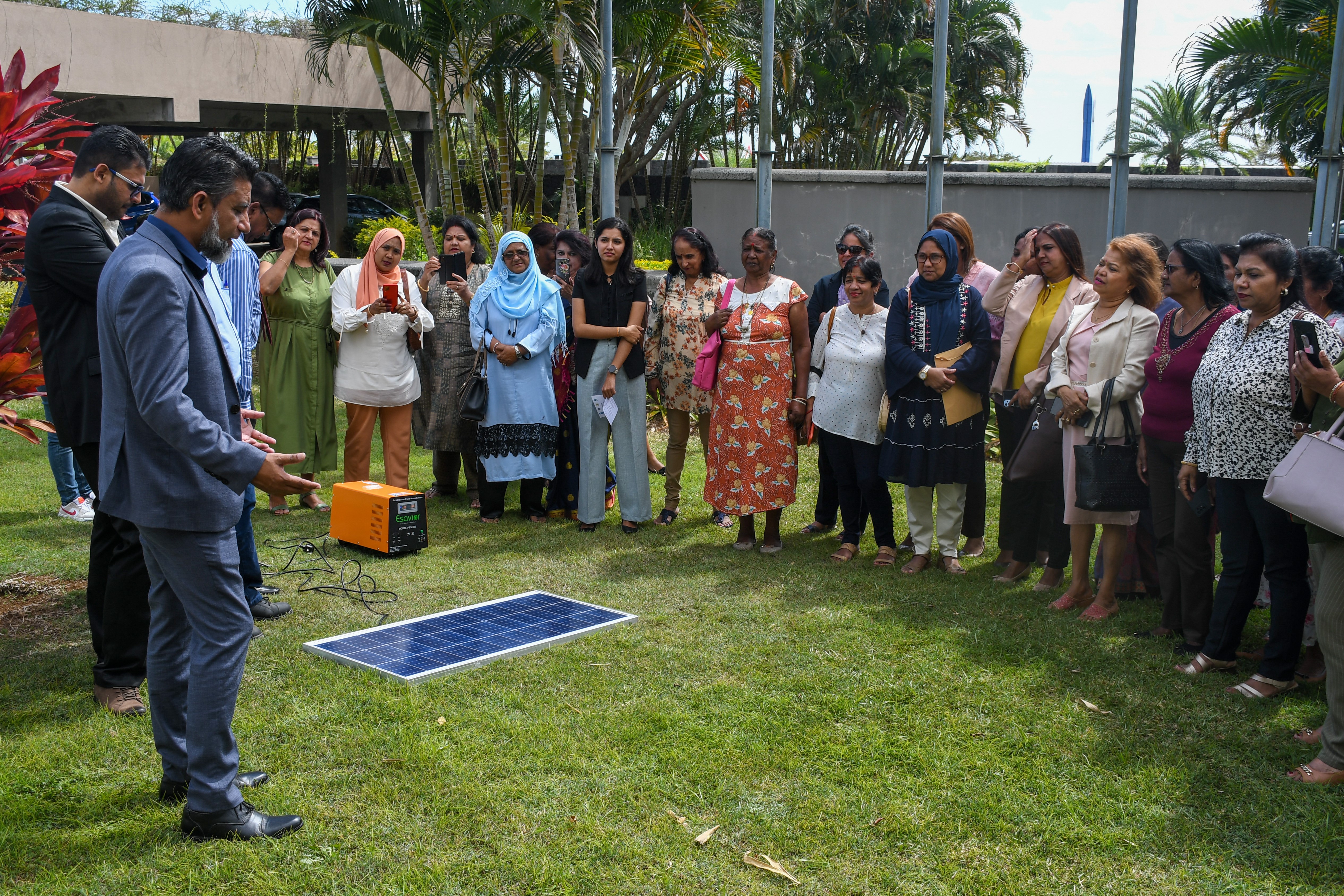By familiarizing women with renewable energy, solar PV systems and the relevant schemes, this workshop has encouraged their active participation in climate change mitigation and awareness raising.
UNDP supports efforts to raise awareness on renewable energy among women associations in Mauritius.
September 13, 2023

This workshop aimed at educating members of women associations about climate change, the significance of renewable energy and the opportunity to benefit from rooftops solar PV through the CEB schemes.
On 11 September 2023, a workshop on Solar Photovoltaic Energy was organized by the National Women Council (NWC), in collaboration with Central Electricity Board (CEB), under the Nationally Appropriate Mitigation Action (NAMA) Project and the United Nations Development Programme (UNDP) under the GCF funded “Accelerating the transformational shift to a low-carbon economy in the Republic of Mauritius” project. The aim of this working session was to educate members of women associations on the basics of solar photovoltaic technology and encourage them to apply to the various RE schemes available in view of empowering women to have greater access to renewable energy. The key SGDs targeted through the workshop were: SDG 5: Gender equality, SDG 7: Affordable and clean energy and SDG 14: Climate action).
At the 16th meeting of the Conference of Parties to the UNFCCC held in 2010, Parties agreed that developing countries would take Nationally Appropriate Mitigation Actions (NAMA) for promoting sustainable development. These refer to a set of actions and policies that countries undertake as part of their commitment to reduce greenhouse gas (GHG) emissions in the long term. In Mauritius, the NAMA initiative received technical and financial assistance from the Global Environment Facility (GEF) and the United Nations Environment Programme (UNEP). It is implemented by the Ministry of Environment, Solid Waste Management and Climate change, the Ministry of Energy and Public Utilities and the CEB in collaboration with the UNDP, under the “Accelerating the transformational shift to a low carbon economy” project. This project aims at enabling the Government of Mauritius to meet its target of using renewables to supply 60% of the country’s electricity needs by 2030 and thus, reducing dependency on fossil fuels.
As raising awareness is a key part of both projects, it has been proposed to hold awareness sessions to build the capacity of women. This working session therefore aimed at educating and inspiring members of women associations about climate change, the significance of renewable energy and the opportunity to benefit from rooftops solar PV through the CEB Renewable Energy Scheme for Religious Bodies, NGOs and Charitable Institutions. Through this scheme, women associations and women-led NGOs can apply for and benefit from free solar PV installations. At an initial stage, seven solar photovoltaic kits will be supplied and installed free of charge to women associations in Mauritius and Rodrigues, which will enable them to receive between 100 and 200 kwh of free electricity every month for twenty years. This initiative not only empowers women economically but also allows them to actively contribute to climate change mitigation.
Involving the community in the path towards a low carbon economy in Mauritius
In her opening speech, Ms. Jugnauth Naeck, Manager of the National Women Council, explained that these sessions were specifically targeted at members of women associations, because “women often face higher risk and greater burden from the impacts of climate change, due to existing cultural norms and roles.” She also emphasized that “building resilience through renewable energy in communities involving women is crucial.”
Mr. Iqbal Dreepaul, Senior Strategic Business Planning Analyst at the CEB, highlighted that “women are champions in the path towards local renewable energy production and environmental protection.” He added that this workshop is a continuation of the work started last year in collaboration with the UNDP, involving the training of women entrepreneurs on the basics of solar photovoltaic energy, provided under the GCF/UNDP project ‘Accelerating the transformational shift to a low carbon economy’.
During the workshop, Mr. Sajjid Mooniaruck, Project Manager of the UNDP-supported, GCF-funded ‘Accelerating the transformational shift to a low carbon economy in the Republic of Mauritius’ project, delivered a presentation renewable energy and women empowerment. During this interactive discussion, he went over key information on climate change, renewable energy and solar photovoltaics and explained the basics of how energy is produced through solar PV kits installed directly on houses. The presentation also included a component of women empowerment, where participants had the opportunity to share their thoughts on issues such as breaking the glass ceiling, and the relatively small proportion (22%) of women currently working in the field of RE globally.
The workshop also included a presentation on the various RE schemes proposed by the CEB, such as the scheme for Religious Bodies, NGOs and Charitable Institutions, the Home Solar Project and the SSDG Net-Billing Scheme. This was followed by a demonstration exercise on how to install solar powered panels, and a session led by CEB staff to guide the participants on how to apply and to fill out the application form for the relevant RE schemes offered by the CEB. The activity ended with a ‘drawing of lots’ ceremony in view of eventually awarding five women associations a free solar PV kit financed through the project.
By familiarizing women with renewable energy, solar PV systems and the relevant schemes, this intensive session has set the stage for their active participation in climate change mitigation and awareness raising.

 Locations
Locations


